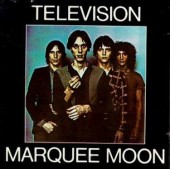Guitarist/singer Tom Verlaine, drummer Billy Ficca and bassist/singer Richard Hell first appeared together as the Neon Boys. Hell and Verlaine were childhood friends who had moved to New York together in 1972 with the intention of starting a band. The group lasted from late 1972 to early 1973. A posthumous 7" featuring "That's All I Know (Right Now)" and "Love Comes in Spurts" was released in 1980.
In late 1973, the trio reformed, calling themselves Television. They recruited Richard Lloyd as a second guitarist. They persuaded CBGB's owner Hilly Kristal to give the band a regular gig at his club which had just opened on the Bowery in New York. (Kristal had planned on dedicating the space to country music, bluegrass and blues music, but punk found a home there first.) Television was the first rock group to perform at the club, which was to become, along with Max's Kansas City, the center of the infant punk scene. The members of Television reportedly constructed the first stage at CBGB's where they quickly established a significant cult following.
Initially, songwriting was split almost evenly between Hell and Verlaine (with Lloyd being an infrequent contributor as well). However, friction began to develop as Verlaine, Lloyd and Ficca became increasingly confident and adept with both instruments and composition, while Hell remained defiantly untrained in his approach. Verlaine, feeling that Hell's frantic onstage demanour was upstaging his songs, reportedly told him to "stop jumping around", and ultimately refused to play Hell's songs (such as "Blank Generation") in concert. This led Hell to leave the group and take his songs with him, forming The Heartbreakers in 1975 with former members of the New York Dolls, and later forming Richard Hell and the Voidoids. Fred Smith, briefly of Blondie, replaced Hell as Television's bassist.
Though Verlaine and Lloyd were nominally "lead" and "rhythm" guitarists, they often rendered such labels obsolete by crafting deft, interlocking parts where the ostensible backing role could be just as intriguing as the guitar solo. Al Handa writes, "Lloyd was the guitarist who affected the tonality of the music more often than not, and Verlaine and the rhythm section the ones who gave the ear its anchor and familiar musical elements. Listen only to Lloyd, and you can hear some truly off the wall ideas being played." The opening of the song "Marquee Moon", from the album of the same name, displays the band's characteristic interlocking melodic and rhythmic guitar lines.
Television also drew inspiration from minimalist composers such as Steve Reich as well as trance-driven rockers such as Van Morrison. Tom Verlaine has often cited the influence of The Rolling Stones "19th Nervous Breakdown" on Television's approach to the guitar, and he has also expressed a fondness for Arthur Lee's Love and the Buffalo Springfield, two groups noted for their dual-guitar interplay. Several critics have also detected the influence of Jerry Garcia in Verlaine's playing, and also Roger McGuinn of The Byrds. And Television's ties to punk were underscored by their late 60s garage-rock leanings, and the band often covered The Count Five's "Psychotic Reaction" and the 13 Floor Elevator's "Fire Engine" in concert.
Television made their vinyl debut with the "Little Johnny Jewel" 7" on the independent label Ork Records in 1975. The song was split into two parts, one on each side of the single. Richard Lloyd apparently disagreed with the selection of this song (preferring the never-released "O Mi Amore") for their debut to the extent that he seriously considered leaving the band. Reportedly Pere Ubu guitarist Peter Laughner auditioned for his spot during this time.
Television's first album Marquee Moon was received positively by music critics and audiences, despite limited sales. Upon its initial release in 1977, Roy Trakin wrote in the SoHo Weekly, "forget everything you've heard about Television, forget punk, forget New York, forget CBGB's.hell, forget rock and roll--this is the real item." More recently, critics ranked it number 83 on cable music channel VH1s 2000 list of "the 100 Greatest Albums of Rock and Roll" and number 128 on Rolling Stone's 2003 list of the 500 greatest albums of all time. It was ranked number two on Uncut magazine's 100 Greatest Debut Records. Stephen Thomas Erlewine writes the album was "revolutionary" and "comprised entirely of tense garage rockers that spiral into heady intellectual territory, which is achieved through the group's long, interweaving instrumental sections."
Television's second album, Adventure was issued in 1978, to less fanfare. The band members had very independent and strongly held artistic visions, and this, along with Richard Lloyd's alleged drug abuse, led to the band's break-up in 1978. Both Lloyd and Verlaine pursued solo careers.
Television reformed in 1992, recording an eponymous third album, and have performed live sporadically thereafter. Since being wooed back onstage together for the 2001 All Tomorrow's Parties at Camber Sands, England, they have played a number of dates around the world, and continue to perform occasionally in New York while touring on an irregular basis.
